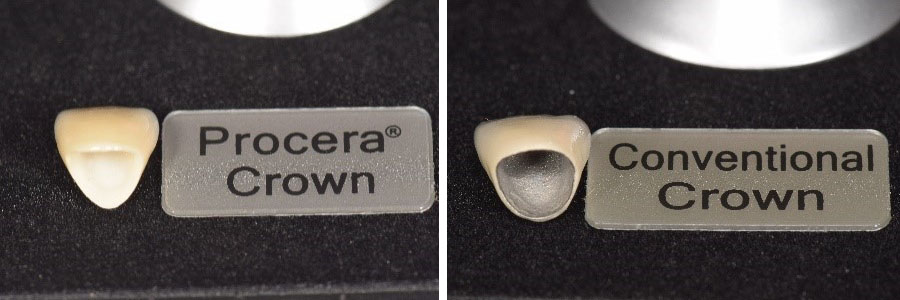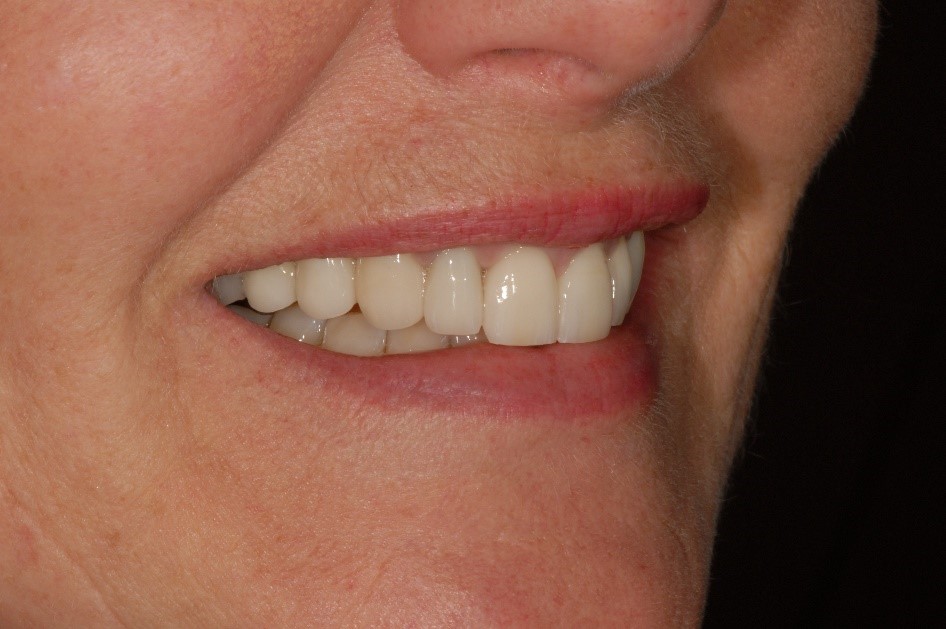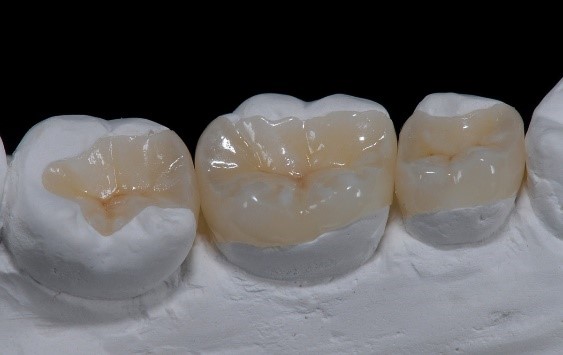Crowns and bridges

Crowns
Crowns offer both cosmetic and oral health benefits by reinforcing the structure of a tooth as well as helping to make a smile look whole and natural again.
Dental crowns are tooth shaped caps that are used to cover and protect compromised teeth and restore them to their natural size, shape and colour. When a tooth has to be removed a crown can be placed in combination with a dental implant.
Indications for a crown
- Fractured or deeply cracked teeth
- Severely decayed teeth
- Large broken fillings
- Large broken fillings
- Teeth requiring additional support and strength
- Chewing surfaces of teeth are worn down due to bruxism (grinding, clenching teeth)
- Bite is not aligned properly
- Teeth that had root canal treatment (Not always)
- Replacing a single missing tooth with a dental implant
What types of crowns are available?
Although there are different types of materials used for crowns your dentist will be able to advise you on the best option for your specific situation.
- Stainless steel: Primarily used as a temporary measure for permanent teeth while the permanent crown is made. Commonly used in primary teeth to protect them from further decay.
- Metal: Will last very long but the metal colour is the main drawback.
- Porcelain-fused-to- metal: Good choice for front or back teeth although the underlying metal can sometimes start to show through as a dark line on the gum line and will get worse if you have receding gums.
- All-resin: Usually only used as temporary crowns.
- All-ceramic or all-porcelain: Better colour match than any other crown type and suitable for people with metal allergies. A very good choice for front teeth.

- Zirconia or milled crown: Gets digitally constructed in our office by special hardware and software to give you the option of same day crown preparation and placement with no temporary crown.

Crown preparation stages
Crowns are typically custom-made to blend seamlessly into each patient unique smile. They are carefully crafted to compliment the surrounding natural teeth and to restore the patients bite.
- The dentist will access the tooth and take an x-ray to make sure that the placement of a crown is the best option for treatment.
- If advanced tooth decay is present, root canal treatment might be advised before doing the crown.
- Preparing the tooth will entail the drilling away of some tooth structure. The amount that will be removed will depend on the type of crown that will be fitted.
- Impressions will be taken to be sent to the dental laboratory as well as a shade to make sure the colour matches the rest of your teeth. It will take about 2 weeks for the crown to be made.
- A temporary crown using temporary cement will be fitted over the prepared tooth for protection while the crown is being made.
- At the second appointment the temporary crown will be removed and the permanent crown checked for fit, colour and occlusion.
- If all is good the dentist will then cement it on the tooth with permanent cement.
Precautions for temporary crowns and bridges
- Avoid sticky and chewy foods
- Minimize the use of that side of your mouth
- Avoid hard foods like – nuts, raw vegetables etc.
- Slide flossing material out between teeth rather than lifting
Caring for your crown
A crown does not require any special care but remember it does not mean the tooth is protected from decay or gum disease. Continue to follow a good oral hygiene routine by brushing, flossing and rinsing with a mouthwash every day.
How long will a crown or bridge last?
On average it can last between 5-15 years. This all depends on the amount of “wear and tear” that the crown is exposed to as well as good oral hygiene routine. Some personal habits may have an influence, for example: Grinding or clenching of teeth (Bruxism), Chewing ice, Biting finger nails or using teeth to open packages.
Crowns can become loose or fall out. If it happens make an appointment to have it cemented back on and make sure to keep the crown safe.
What are Inlays?

An inlay is a variation on the technique of dental crowns. The difference between these crowns and the crowns discussed is the coverage of the underlying tooth. While the “traditional” crown covers the entire tooth; inlays cover the underlying tooth to a lesser extent. This will be a good treatment option for replacing a big filling and still keep some tooth structure.
Bridges
A dental bridge is an affordable and time tested treatment for missing teeth. Dental bridges literally bridge the gap that is created when teeth are lost.
A typical bridge consist of crowns on both the teeth either side of the gap that act as anchors (abutments) and a false tooth (pontic) in the gap that is attached to the crowns. The amount of anchor teeth and false teeth being used will depend on the individuals dental needs. Dental bridges can also be supported by implants.
A variety of materials can be used like: gold, alloys or porcelain although the latter will be the better option for aesthetic consideration.
Indications for a bridge
- One or more missing teeth
- To restore your smile and maintain the shape of your face
- Restore the ability to properly chew and speak
- Prevent remaining teeth to drift out of position or to over erupt
- When implant treatment is contra indicated
Bridge preparation stages
- First the dentist will do a consultation and take x-rays to make a diagnosis and establish a treatment plan for your specific dental needs.
- With the first visit the preparation of the bridge will be done by contouring the abutment teeth by removing some enamel to allow space for the crowns to be fitted over the teeth.
- Impressions and tooth shade are taken to be sent to a dental laboratory for the bridge to be made.
- A temporary bridge will be made and fitted with temporary cement to protect the exposed teeth and gums while the permanent bridge will be made.
- The laboratory time to make the bridge will be approximately 2 weeks.
- During the second visit the temporary bridge are removed and the permanent bridge checked and adjusted if necessary before fitting it permanently with cement.
Caring for your bridge
The success of a bridge depends on the solid foundation of the surrounding teeth and gums. Be aware that anchor teeth on bridges can still get decay and gum disease. It is important to have a good daily oral hygiene routine as well as regular dental check-ups. Special floss is used to floss underneath the bridge and your dentist or oral hygienist will show you how to use it.
Types of Bridges:
Full ceramic bridge

This is the most common type of bridge that we do in our practice and also the one discussed in the above article.
Cantilever bridge
When there are adjacent teeth on only one side of the missing tooth or teeth. A single crown will support the entire bridge which typically consists of two pontics. This type of bridge is not very common anymore and is also not recommended for back teeth.
Maryland bonded bridge

Typically this type of bridge will be used to replace a single tooth but in some cases it can be more. The preparation procedure is less invasive seeing that minimal alteration of the surrounding teeth is necessary. The bridge consist of a pontic that have two wings attached to each side and gets bonded to the adjacent teeth with cement.
Implant supported bridge

This is similar to a traditional dental bridge, but instead of being supported by natural teeth, implants are used.
Please be advised that the above options are all subject to certain criteria pertaining every individuals mouth and therefore an appointment for a thorough evaluation, discussion of options and treatment planning will have to be scheduled.
